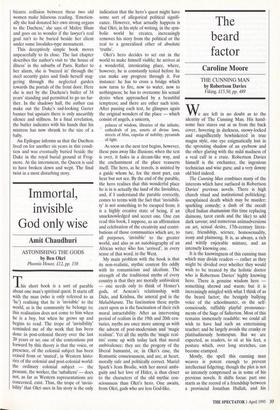Immortal, invisible God only wise
Amit Chaudhuri
ASTONISHING THE GODS by Ben Okri Phoenix House, £12, pp. 158 This short book is a sort of parable about one man's spiritual quest. It starts off with the man (who is only referred to as `he') realising that he is 'invisible' to the world, as is the community he belongs to; this realisation does not come to him when he is a boy, but when he grows up and begins to read. The trope of 'invisibility' reminded me of the work that has been done in post-colonial theory over the last 20 years or so; one of the contentions put forward by this theory is that the voice, or presence, of the colonial subject has been erased from or 'muted', in Western histo- ries of the colonial and post-colonial world: the ordinary colonial subject — the peasant, the worker, the 'subaltern' — does not, as far as Western representations are concerned, exist. Thus, the trope of 'invisi- bility' that Okri uses in his story is the only indication that the hero's quest might have some sort of allegorical political signifi- cance. However, what actually happens is that Okri, in his style of writing, in the sym- bolic world he creates, increasingly removes his story from the political or the real to a generalised ether of absolute `truths'.
Okri's hero decides to set out in the world to make himself visible; he arrives at a wonderful, intoxicating place, where, however, he is constantly tested before he can make any progress through it. For instance: he has to cross a bridge which now turns to fire, now to water, now to nothingness; he has to overcome his sexual desire when approached by a beautiful temptress; and there are other such tests. After passing each test, he glimpses again the original wonders of the place — which consist of angels, a unicorn,
palaces of wisdom, libraries of the infinite, cathedrals of joy, courts of divine laws, streets of bliss, cupolas of nobility, pyramids of light.
As soon as the next test begins, however, these pass away like illusions; when the test is over, it fades in a dream-like way, and the enchantment of the place reasserts itself. The hero, as he travels, is assisted by a guide whom he, for the most part, can hear but not see. By the end of the parable, the hero realises that this wonderful place he is in is actually the land of the Invisibles, and, if I understand the parable correctly, comes to terms with the fact that 'invisibili- ty' is not something to be escaped from; it is a highly creative state of being, if an unacknowledged and secret one. One can read this book, I suppose, as an affirmation and celebration of the creativity and contri- butions of those communities which are, to all purposes, 'invisible' to the greater world, and also as an autobiography of an African writer Who has 'arrived', in every sense of that word, in the West.
My main problem with the book is that its non-realistic, mythic content fits oddly with its romanticism and idealism. The strength of the traditional myths of every country is that they are morally ambivalent — one needs only to think of Homer's gods, of Aeneas's relationship with Dido, and Krishna, the amoral god in the Mahabharata. The fascination these myths exert upon us is the fascination of their rich moral intractability. After an intervening period of realism in the 19th and 20th cen- turies, myths are once more among us with the advent of post-modernism and 'magic realism'. Yet all the myths the 'magic real- ists' come up with today lack that moral ambivalence; they are the progeny of the liberal humanist, or, in Okri's case, the Romantic consciousness, and are, at heart, morally safe and politically correct. Muriel Spark's Jean Brodie, with her moral ambi- guity and her love of Hitler, is thus closer to the characters of the old mythic con- sciousness than Okri's hero. One awaits, from Okri, gods who are less God-like.


























































 Previous page
Previous page